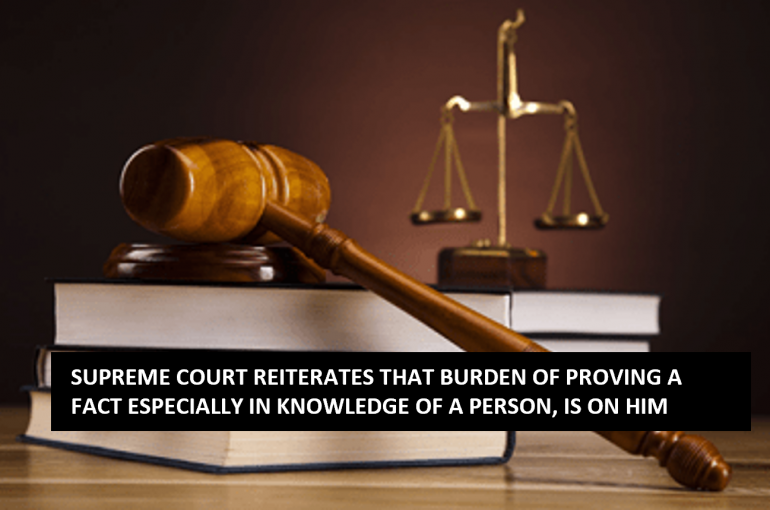SUPREME COURT REITERATES THAT BURDEN OF PROVING A FACT ESPECIALLY IN KNOWLEDGE OF A PERSON, IS ON HIM
In a recent Criminal Appeal, the Supreme Court comprising of three Judge Bench of Chief Justice N.V. Ramana, Justice Krishna Murari and Justice Hima Kohli in Bidyadhar Praharaj vs State of Odisha Criminal Appeal No. 860 of 2022 vide Order and Judgement dated 20.05.2022, upheld the Impugned Order dated 08.11.2016 passed by the High Court of Odisha at Cuttack and reaffirmed that burden of proving a fact especially in knowledge of a person, is on him in terms of Section 106 (Burden of proving fact especially within knowledge) Evidence Act, 1872.
In the present case, the Appellants- original Accused No. 1 and 2 are husband and wife. The Appellants were tenants of one, Mayadhar Mohapan (Landlord). The said Landlord lodged an FIR dated 21.07.2008 stating that an unknown person had attacked the Appellants at around 07:30 PM. The Landlord rushed to the incident place when he heard a loud noise, he saw an unknown person using ‘Kata’ to assault the Appellants. Soon after the police came to the spot and found that the unknown person was dead. Later on 24.07.2008, one Rajan Rana identified the Deceased to be, Sanjay Rana. He further disclosed that the Deceased, Sanjay Rana had a love relationship with the Appellants’ Daughter (Accused No.3).
In the post-mortem, it was revealed that the Deceased died due to compression in lower part of the neck. Thus, death was homicidal in nature. Therefore, a Charge Sheet was filed against the Appellants and Accused No.3 for offences under Sections 302 (Punishment for murder), 201 (Causing disappearance of evidence of offence, or giving false information to screen offender), 109 (Punishment of abetment if the act abetted is committed in consequence and where no express provision is made for its punishment) read with 34 (Acts done by several persons in furtherance of common intention) of IPC.
The Appellants have been arrayed as Accused No.1 and 2 in FIR No. 120 of 2008. The Appellants along with Accused No.3 had been charged under Sections 302, 201 read with Section 34 of the Indian Penal Code (IPC). The Appellants were convicted under the said provisions vide Order and Judgment dated 30.03.2015 of Sessions Court of Odisha in C.T. Case No. 76 of 2010 and were sentenced to a rigorous imprisonment for life and fine of Rs. 10,000/- each. While the Accused No.3 was convicted under the aforesaid provisions and was sentenced to a rigorous imprisonment for life and fine of Rs. 10,000/-.
Being aggrieved by the Order and Judgement dated 30.03.2015 of Sessions Court, the Appellant preferred an Appeal before the High Court of Odisha at Cuttack. The High Court vide Impugned Order dated 08.11.2016 acquitted the Accused No.3 from all charges while upholding the conviction of Accused No. 1 and 2. However the conviction under Section 302 IPC was modified to conviction under Section 304 (II) IPC, thereby reducing the term of rigorous imprisonment for a term of 5 years and fine of Rs. 10,000/-
Feeling dissatisfied by the Impugned Order dated 08.11.2016 of the High Court of Odisha, the Appellants preferred the present Appeal before the Hon’ble Supreme Court. The Appellants contented that reliance on Section 106 (Burden of proving fact especially within knowledge) of Evidence Act, 1872 is misconstrued in absence of clear evidence pointing to the guilt of the Appellants. Further, the High Court erred in convicting the Appellants by entirely relying upon circumstantial evidence. Additionally, in absence of any eyewitness, the High Court also erred in dismissing the contention of the Appellants regarding the disputed time of death of the Deceased.
While the Respondent State contended that all the facts i.e. the relationship between Accused No.3 and Deceased, exchange of money between Accused No.3 and Deceased, date, place and time of murder of Deceased, and the presence of Appellants inside the tenanted portion of the house, has rightly observed that the incident did occur at the time and place alleged by the Prosecution wherein Appellants were definitely involved.
The Apex Court after hearing both the Parties observed that the relevant facts and contentions made by the Appellants and the Respondent raises the key issue which requires determination in the instant case is that whether the Prosecution has successfully discharged its burden of proof, and that the chain of events has been successfully established so as to attract application of Section 106 of the Evidence Act, 1872.
The Supreme Court held that, the High Court has rightly observed that the statement of witnesses clearly spells out a motive for the commission of offence. It also establishes that the claim made by the Appellants that the Deceased was not known to them is also false, especially considering that Accused No.3 has admitted in her deposition that the Deceased used to visit the house of the Appellants. Furthermore, regard must also be had to the statement of the medical expert which revealed that the cause of death of the Deceased was asphyxia due to compression of lower part of the neck. It was observed that the Deceased was assaulted by 2 or more persons and that the injuries were homicidal in nature.
In the instant case, the Apex Court thus held that the Prosecution had succeeded in establishing intention of the Appellants for the commission of the offence. Therefore, having regard to the above facts and reasons stated therewith, the Supreme Court held that the entire sequence of events strongly point towards the guilt of the Appellants, and that the Appellants have failed to offer any credible defense in this regard. Thus, the Apex Court reaffirmed the Order of the High Court and the Appeals were accordingly dismissed.
Varnim Gupta
Legal Associate
The Indian Lawyer & Allied Services





































Leave a Reply